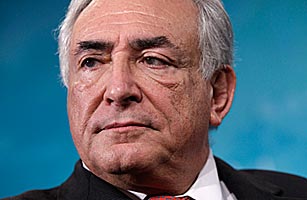
The news of the arrest of IMF Managing Director Dominique Strauss-Kahn, 62, was shocking in its own right: late Saturday afternoon, Port Authority police took Strauss-Kahn from the First Class cabin of an Air France flight at Kennedy Airport about to depart for Paris amid allegations he attempted to rape a midtown Manhattan hotel maid earlier in the day. But considering the fact that the former French finance minister Strauss-Kahn was widely expected to run against President Nicolas Sarkozy next year, the turn of events was particularly stunning.
In fact DSK, as the French call one of the country’s leading political figures, happens to be on the cover of virtually every French magazine this week as the country’s possible next President, and several have recently featured photos of him with his wife Anne Sinclair, a U.S.-born veteran French television journalist. So it didn’t take long for the news, which broke at about 2 a.m. Paris time, to throw next May’s French presidential race into upheaval
by quite possibly removing the only candidate clearly capable of beating Sarkozy.
On Sunday French liberal politicians urged people not to rush to judgment. Strauss-Kahn’s close associate and spokesman Jean-Marie le Guen, told Europe 1 radio that “this episode does not resemble the Dominique Strauss-Kahn I know.” Sgolne Royal, who beat out Strauss-Kahn for the party nomination in 2006 beore her poorly-run presidential race was blamed for having buried the Socialists’ chances, said on Sunday that “there must be a presumption of innocence.”
The New York Police Department claims that at about 1 p.m. on Saturday, a hotel maid entered a $3,000-a-night suite at the Sofitel near Times Square, believing that it was empty. Strauss-Kahn then emerged naked from the bathroom, and grabbed her, pulled her into the bedroom and threw her on to the bed, before trying to lock the suite’s main door, according to New York Police Dept. Deputy Commissioner Paul Browne, who outlined the charges to reporters. “She fights him off, and then he drags her down the hallway to the bathroom, where he sexually assaults her a second time,” he told Reuters.
The maid, 32, finally managed to push Strauss-Kahn away and escape, according to Browne, and her colleagues called 911. Strauss-Kahn had checked out by the time police arrived at the hotel, leaving behind his cell phone. Strauss-Kahn was arrested on charges of attempted rape, conducting a criminal sexual act, and unlawful imprisonment of the woman. Early Sunday, Strauss-Kahn’s lawyer, Benjamin Brafman, told Reuters his client, who was still in NYPD custody and was expected to appear in state court sometime Sunday, would plead not guilty.
Since then, Strauss-Kahn has won praise for his handling of the global meltdown. This time, however, IMF officials have immediately distanced themselves from their chief. A two-sentence IMF statement on Sunday said that Strauss-Kahn’s arrest was a matter for the NYPD and his personal attorney, and that the organization “remains fully functioning and operational.” Nonetheless, the IMF could face an internal crisis now, since Strauss-Kahn’s deputy, John Lipsky, announced last Thursday that he was leaving the organization in August.
Across Europe, too, Strauss-Kahn’s arrest will have a major impact. It could impact critical negotiations over the E.U.’s deep debt crisis, in which Strauss-Kahn has been a key — if not the key — player. He was due to be at emergency debt meetings in Brussels this week, and perhaps mindful that he could soon be one of the E.U.’s most powerful leaders, as French President, he has cautioned for months against harsh austerity measures for debt-ridden countries Portugal and Greece.
That now seems like a comparatively simple challenge. Rather than fighting to move into the Elysee Palace, Strauss-Kahn suddenly will have to fight to keep himself out of jail, perhaps for years. See the world’s most influential people in the 2011 TIME 100.
See TIME’s 140 best Twitter feeds.